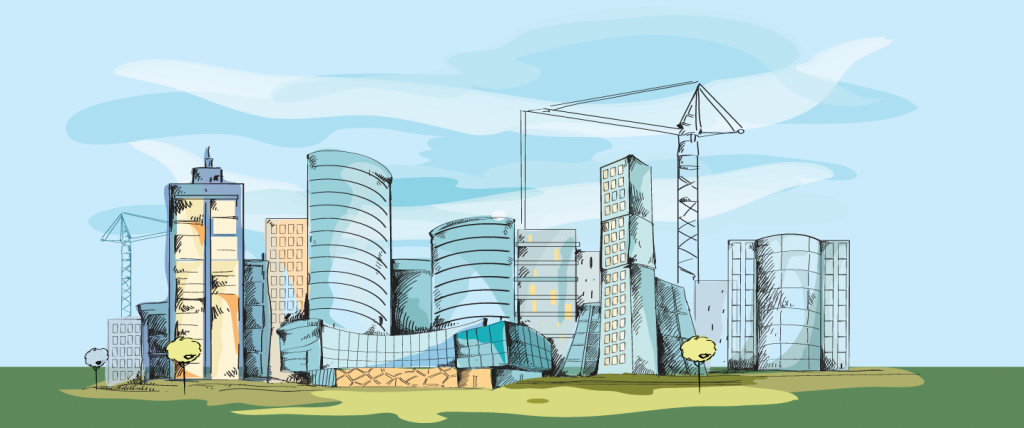Insights
Circular link between climate change and real estate sector
May 4, 2022Progressing climate change has become a worldwide challenge. Key greenhouse gas emitters are construction, transport, and manufacturing sectors. Climate change has increased the incidences of extreme weather occurrences which may cause impairment to human life, health properties, economy, environment, and culture. Real estate sector is exposed to a combination of threats caused by climate change-the form and intensity depends on location and specificity of ecological condition. Incidences threatening the real estate sector are illustrated below:

- Torrential rains– sewage system of inadequate capacity, flooding in buildings, basements, dampness in buildings and its impact on insulation thus damaging the buildings and infrastructure;
- Extreme weather
- High temperature – overheating of interiors of the residential and commercial units, its effect on the quality of building constituents and materials, soil erosion and its result on building foundation impact on technical installation insulation;
- Extreme cold – very cold within the residential and commercial units, soil solidification and its effect on building foundation, quality of building ingredients and materials impact on technical installation;
Read More+
- Rising sea levels: climate change contributes to increased seal levels not only causing structural damage to buildings due to flooding but also making these unsafe as also requiring higher repairs and maintenance costs;
- Air pollution: resulting in damages to buildings façades
Such events contribute to material and non-material losses in real estate. Lately, in addition to climate change mitigation policy, climate change adaptations have gained significance. Adapting real estate climate change requires appropriate strategic and operational tools that require being established at each government level i.e. local, district and central. So when undertaking a project via climate change adaptation maladaptation must be circumvented. Maladaptation is a situation where activities are undertaken to provide benefits to the building however they cause loss e.gs. (i) augmented use of air-conditioners and other devices to make life in concrete buildings cooler and easier inside causes hot air to be spewed outside thereby increasing the heat outside, higher green gas emission and further impacting the climate; and (ii) planting trees in the building compound to provide share and cool air to the residents and the tree falling on the building due to strong winds causing damage to the building.
There is a peculiar relationship between construction activity and climate risk. In the first place, it is the rampant clearance of mangroves, salt pans, and green zones, and the cropping of cemented structures thereon, that leads to the spike in temperature and the depletion of oxygen levels in the air.
Yet, construction activity must go on to accommodate the huge urban influx of blue- and white-collar workforces. The goal then is to minimise the impact or construction activity on climate and vice versa, through a series of well-thought out policy initiatives which may inter alia include:
- Appropriate planning: involving identification of threatened areas, imposing construction restriction in endangered areas, specifying terms for construction and management for built up areas, growing and providing access to green areas available to residents;
- Promoting sustainable construction: by a system of incentives to developers, investors, owners, managers, society;
- Investment in infrastructure: rain water harvesting, thermal modernization of buildings using renewable sources of energy, improving energy efficiency of buildings;
- Strengthening infrastructure: adopting innovation and new technologies and services, energy transmission networks etc.;
- Education and information: raising awareness of threats and effects of climate change, best practices adopted internationally, methods that could be applied to find solutions, educating about environmental issues faced globally, amongst developers, investors, households, real estate owners, government officers, architects, contractors, engineers, brokers, consultants Studies The initiatives when implemented in a planned manner can boost real estate performance and investment attractiveness.
Implementing these initiatives will reduce climate inflicted losses, boost real estate performance and develop infrastructure which is positive for social and economic growth of the society.
Besides the adverse effect of climate change, there are also prospects for the real estate sector triggered by the climate change, such as developing invention in solar heating and current insulation, upgraded access to latest technology solutions at lower costs, developing and enhancing expertise in the areas of sustainable water management, rain water harvesting, reduced water consummation for watering plans, reduced waste water, sewage management better heating and cooling systems, condensed energy demand in hot season – proper shading, blinds, abridged light diffusion etc.; lower investment in energy grid, supply of power at reduced price; expansion of green infrastructure and development of environmentally friendly infrastructure which offers leisure opportunities’ e.g. cycling and walking tracks, parks thereby improving the overall aesthetics, quality of life and allure of cities to its residents;
Irrespective of climate change vulnerability faced by the real estate sector, the role and relevance of real estate sector in advancing innovation, adopting new technologies will not only improve the resilience of cities, but also increase the attractiveness and competitiveness of real estate and the demand for it.
This article was originally published in The Times of India on 4 May 2022 Written by: Ashoo Gupta, Partner. Click here for original article
Read Less-
Disclaimer
This is intended for general information purposes only. The views and opinions expressed in this article are those of the author/authors and does not necessarily reflect the views of the firm.


